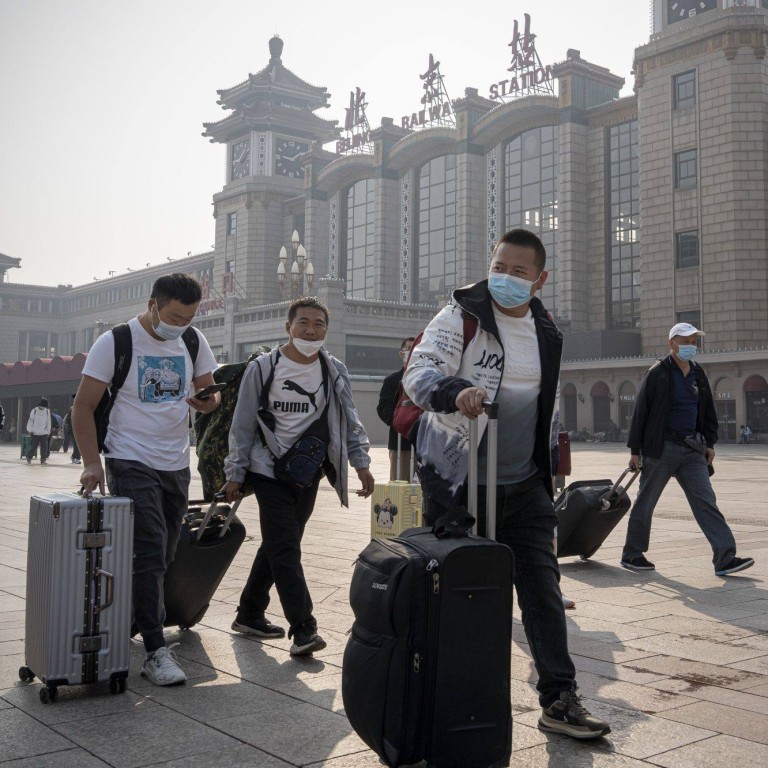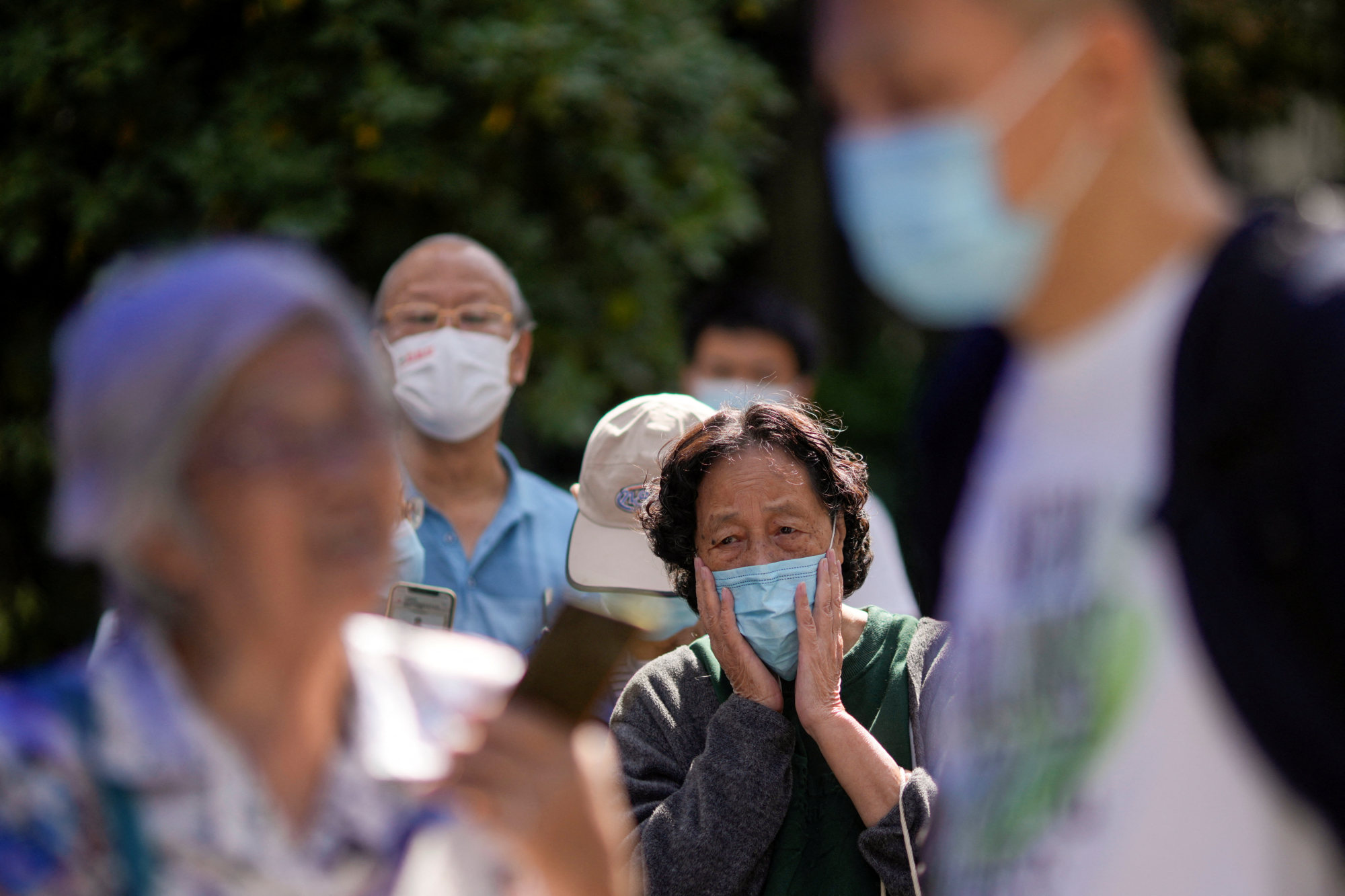
Why the National Day ‘golden week’ holiday is causing frustration in China
- Usually a time for travel and family gatherings, many people will not be going anywhere during the break because of Covid-19 curbs
- Some will have to work for seven straight days after the holiday, and many have complained about the arrangements on social media
Many have taken to social media to complain about the arrangements. On microblogging site Weibo, “National Day holiday: rest for 7 days and work for 7 days in a row” is a trending hashtag.
The topic has drawn more than 600 million views and nearly 30,000 users had commented as of Monday, many unhappy that they will have to work on the weekend afterwards to make up for the break.
“It kills me just imagining that I’ll have to work non-stop for seven consecutive days,” said one post on Weibo. “I hate the weekend work thing. Why can’t the government just be honest and say the holiday is only three days? It makes no sense to extend it when we cannot travel freely.”

The National Day break is one of 11 public holidays in mainland China. Initially a three-day break to mark the founding of communist China on October 1, 1949, it was extended to seven days when the golden week system was introduced in 1999. That was done to allow people to take longer trips and boost consumption.
For most Chinese, whose annual paid leave had been limited or non-existent, the move unleashed an appetite for travel and strong growth in holiday spending. Consumption during the October golden week hit record highs most years before the pandemic. Tourism revenue surged from 100 billion yuan in 2009 to 649 billion yuan in 2019, according to official data.
At the same time, holidaymakers have complained of poorly managed and overloaded tourist resorts, substandard travel services and fatigue from working a long week after the break.
Despite the complaints, authorities have stuck to the golden week system.
Lou Jiajun, a tourism expert with East China Normal University, told the official Shanghai Observer website that this was because of its effect on stimulating consumption. But also because “an increase in holiday days will have implications for production and supply chains in China, the world’s manufacturing hub”.
Scrapping of Hong Kong hotel quarantine means little for mainland China travellers
Lou said that while the system had problems, it still meant people could make a long journey, and helped migrant workers to travel and see their families.
Health authorities have encouraged people to stay in their cities from September 10 until the end of October.
Passengers on planes, trains and interprovincial buses and ferries must provide negative PCR test results from the previous 48 hours. The National Health Commission has also urged people travelling between provinces and regions to “voluntarily” take PCR tests on arrival.
In Beijing, some residents said they were not able to buy tickets to leave the capital.
One of them is 50-year-old migrant worker Liu Meng. He had planned to visit his ailing mother in Xuchang, in the central province of Henan, but there were no train tickets and he cannot afford to fly.
“I don’t believe they were snapped up so quickly – I was on the railways ticket app as soon as the presale started and the system said it was sold out from the start,” Liu said.
“Holiday tickets are usually hard to get, but they don’t usually get snapped up in the first few minutes. Why not just tell us we can’t leave Beijing and save time?”
Many social media users said that when they tried to book over the weekend, they could not get a train ticket out of Beijing to any destination for Friday or Saturday.
A limited number of tickets are available starting from Tuesday.
The Ministry of Railways would not comment on whether it had reduced the number of available tickets for the holiday period. It expects 68.5 million train trips to be made from September 28 to October 8 – the lowest number for the holiday period since the pandemic began.
Hong Kong police to deploy large number of officers on National Day, chief says
Meanwhile, many universities and colleges have told students they will get just three days off from Saturday and that they will not be able to leave the campus during the break.
That is the case for Jenny Gu, 19, who studies at a university in the northern port city of Tianjin.
“I’ve been spending all my time on campus since the semester started at the beginning of the month,” Gu said. “I thought university would be the start of a colourful time in my life, but sadly I’ve been held captive by the Covid-19 control measures.”
Students at most universities have been told to stay on campus since they returned from summer break, when there were widespread Covid-19 outbreaks across China. Tianjin’s latest wave of infections started about a month ago and it has since reported more than 500 cases, most of them asymptomatic.

Health authorities announced tighter curbs nationwide earlier this month. Wu Liangyou, an official with the NHC, said this was to avoid “large-scale outbreaks” as there was a greater risk of the virus spreading with more people on the move ahead of the National Day holiday.
The NHC called for large gatherings such as exhibitions and arts events to be postponed until after October unless they were “necessary”, without elaborating. Anyone checking in at a guest house or hotel or entering a tourist attraction has to show a negative PCR test result from within 72 hours.
And in many places, junior and middle school pupils who travel outside their city or province during the holiday will have to spend several days in home quarantine – seven days for those in Beijing – before they can return to the classroom.

